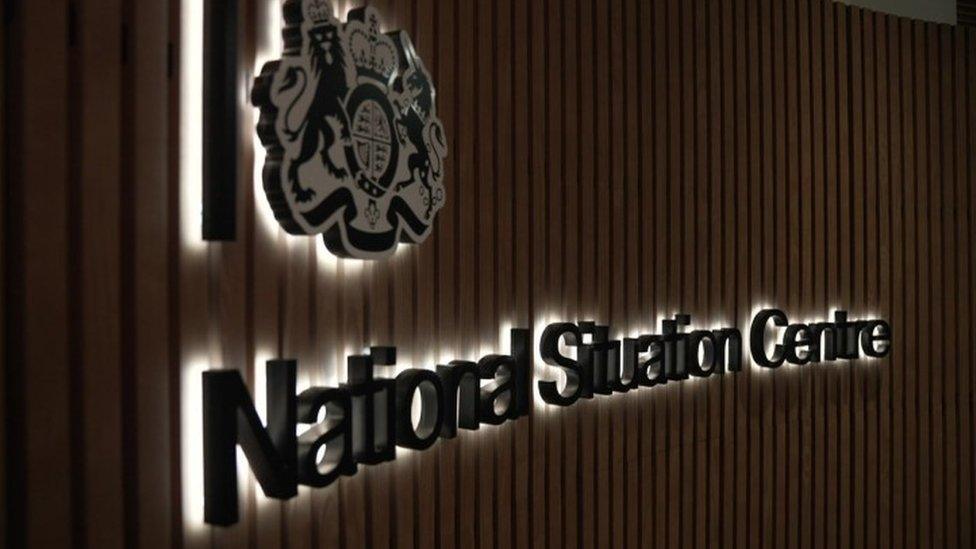Inside the government's secret data room
- Published

Analysts work to determine what risks are and what data would help mitigate them
In a room whose precise location is kept secret for security reasons, lies SitCen - the government's new Situation Centre.
BBC News was given access to the room, filled with video screens showing streams of data.
The room sits close to the Cabinet Office Briefing Room (COBR), where ministers and officials take decisions on how to respond to anything from a natural disaster to a terrorist attack.
And the job of the analysts in SitCen is to enable policymakers to act quickly and use the best possible information.
'Step forward'
Launched this September, it has already been used in the dealing with events such as the explosion at a Liverpool hospital and fuel-supply shortages.
In the latter case, SitCen was able to show which parts of the UK were suffering from shortages, to ensure the responses - such as tankers driven by the military - were going to the right place.
"This is a massive step forward in our capability," Chancellor of the Duchy of Lancaster and Minister for the Cabinet Office Steve Barclay told me inside SitCen.
"The right decisions require the right data at the right speed."
National-security 'watchkeepers'
The centre is run by the Civil Contingencies Secretariat, part of the Cabinet Office.
On a vast wall-sized video screen, an analyst shows how feeds of data from other departments and agencies inside and outside government - ranging from geospatial information to weather patterns to traffic flow - can be used to create dashboards.
These can be overlaid to understand potential knock-on consequences - how a natural disaster could affect power or food supplies, for example, or what nearby hospitals might be put under strain or require evacuation.
Software can visualise the results to make it easier to communicate.
And national-security "watchkeepers" maintain a 24-7 eye on events in the UK and around the world.
Biological-warfare attack
When a crisis is not under way, the team work on a list of well over 100 possible risks listed on a UK National Security Risk Register and try to understand what data feeds they would need if each one unfolded.
These can include everything from assassinations of public figures to a biological-warfare attack, as well as natural disasters.
But a House of Lords committee report has called for this risk-planning process to be more open and accessible - and work across a longer timeframe.

The exact location of the centre is a closely guarded secret
Cyber incidents have risen up the list of UK risks in recent years.
If a cyber-attack's impact was only online, it would be handled by the National Cyber Security Centre.
But if it had significant real-world impact - such as shutting down parts of the NHS in the way Ireland's health service was hit this year - it would be handled by SitCen, which would try to decide what those broader effects might be.
Wider shift
SitCen illustrates the way in which data is moving to the heart of government.
This reflects a wider shift in society, accelerated by the pandemic, towards dependence on technology.
And it is one reason the latest version of the UK's cyber strategy covers much more than the narrower field of cyber-security where it started out, a decade ago.
But officials acknowledge accessing and integrating data remains a work in progress and the test will come as the capability is put to use.
Malicious acts
Strength in cyber-space will be a vital source of national power, according to the new, five-year strategy.
It sets out how the government wants to improve defences but also use innovation to drive growth and secure the UK's position internationally - and £2.6bn of funding was announced in the last spending review.
The emphasis now is on building up the resilience of individuals and businesses across the UK against malicious acts in cyber-space.
Cyber-attacks increasingly have real-world consequences - local councils such as Hackney becoming unable to offer services to residents, for example.
Economic growth
In the US, an attack on a major oil pipeline caused panic buying of fuel.
But the strategy also focuses on making the most of the opportunities cyberspace and technology provide, including in ensuring the economic growth linked to the digital sector is spread across the country and not just concentred in London and the South East.
Strength in cyberspace will also matter in projecting the UK's power and influence around the world, it says.
And all of this, as with the arrival of SitCen, makes clear technology and data, increasingly underpins our future security.
Related topics
- Published6 September 2021
- Published10 December 2021
